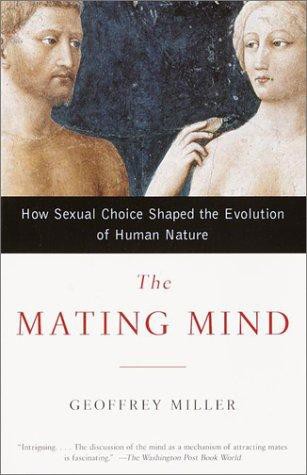
The Mating Mind: How Sexual Choice Shaped the Evolution of Human Nature PDF
Preview The Mating Mind: How Sexual Choice Shaped the Evolution of Human Nature
Evolutionary psychology has been called the "new black" of science fashion, though at its most controversial, it more resembles the emperor's new clothes. Geoffrey Miller is one of the Young Turks trying to give the phenomenon a better spin. In The Mating Mind, he takes Darwin's "other" evolutionary theory--of sexual rather than natural selection--and uses it to build a theory about how the human mind has developed the sophistication of a peacock's tail to encourage sexual choice and the refining of art, morality, music, and literature.
Where many evolutionary psychologists see the mind as a Swiss army knife, and cognitive science sees it as a computer, Miller compares it to an entertainment system, evolved to stimulate other brains. Taking up the baton from studies such as Richard Dawkins' The Selfish Gene, it's a dizzyingly ambitious project, which would be impossibly vague without the ingenuity and irreverence that Miller brings to bear on it. Steeped in popular culture, the book mixes theories of runaway selection, fitness indicators, and sensory bias with explanations of why men tip more than women and how female choice shaped (quite literally) the penis. It also extols the sagacity of Mary Poppins. Indeed, Miller allows ideas to cascade at such a torrent that the steam given off can run the risk of being mistaken for hot air).
That large personalities can be as sexually enticing as oversize breasts or biceps may indeed prove comforting, but denuding sexual chemistry can be a curiously unsexy business, akin to analyzing humor. As a courting display of Miller's intellectual plumage, though, The Mating Mind is formidable, its agent-provocateur chest swelled with ideas and articulate conjecture. While occasionally his magpie instinct may loot fool's gold, overall it provides an accessible and attractive insight into modern Darwinism and the survival of the sexiest. --David Vincent, Amazon.co.uk
From Publishers WeeklyThe booming but controversial field of evolutionary psychology attempts to explain human feelings and behaviors as consequences of natural selection, using plausible analogies from the animal kingdom to show (for example) why we have the capacity to enjoy music, or why men commit violent crimes. Miller, an evolutionary psychologist at University College-London, argues that much of human character and culture arose for the same reason peacocks have beautiful tails: mating purposes. A peacock that can find enough to eat and avoid being eaten despite such an enormous appendage must have very good genes; by displaying its tail, then, a peacock displays its potential to be a good mate. Miller looks at several kinds of sexual selection. "Romantic" behavior like the making of complex art wouldn't have helped our ancestors find more food or avoid predators. It might, however, have helped display the fitness of proto-men for the proto-women with whom they wanted to mate--and vice versa. If we like to show off our large vocabularies, it's at least in part because our ancestors sought smart partners. Miller's enjoyable book also surveys animal kingdom parallels and recent theoretical arguments about sexual selection. Like most popular evolutionary psychologists, however, Miller doesn't always distinguish between a plausible story and a scientifically testable hypothesis. And some of his arguments seem covertly circular, or self-serving: Do we really need Darwin to explain why men publish more books than women? Still, picturing "the human brain as an entertainment system that evolved to stimulate other brains," Miller provides an articulate and memorable case for the role of sexual selection in determining human behaviors. Agent, John Brockman.
Copyright 2000 Reed Business Information, Inc.
